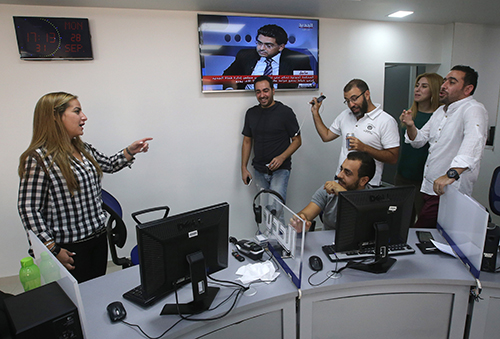On March 8, the Appeals Panel of the Special Tribunal for Lebanon reversed the September 18 conviction of Karma Khayat, a journalist who had been ordered to pay a €10,000 (USD$11,064) fine because her channel broadcast interviews with confidential witnesses.
While the ruling was good news for Khayat, it is not a clear victory for press freedom. That is because the appeals panel missed an historic opportunity to deliberate on a key issue confronting the system of international justice: how to strike the correct balance between the right to free expression and the responsibility of courts and tribunals to safeguard judicial proceedings and the administration of justice. Here’s why.
The Special Tribunal for Lebanon was established in May 2007 by UN Security Council Resolution 1757 to investigate a 2005 bomb attack that killed 22 people, including former Prime Minister Rafik Hariri. Since its foundation, the tribunal has been beset by controversies, some reflecting the polarized nature of Lebanese society and others the tribunal’s own shortcomings. The Syrian government and its ally Hezbollah have been broadly implicated in the Hariri murder and five suspects tied to Hezbollah are being tried in absentia. Their supporters have mounted fierce resistance to the tribunal’s investigation, through threatening speeches and efforts to undermine it at every turn.
One of the tribunal’s challenges has been protecting the identity of the confidential witnesses crucial to a successful investigation. In August 2012, the independent Beirut-based TV station Al-Jadeed aired a five-episode series discussing alleged leaks from the tribunal and featuring interviews with purported confidential witnesses whose faces had been obscured to protect their identity. The tribunal, fearing that the broadcast could undermine public confidence in the investigation and deter future witnesses from coming forward, initiated legal action for contempt against the station and its journalist, Khayat, on two counts. The first count was for knowingly and willfully interfering in the administration of justice by reporting on purported confidential witnesses, and the second count was for failing to remove the broadcast from the website and YouTube channel after Khayat was allegedly notified by email. Khayat, who was on vacation when the message was sent, claimed in court she never received it.
The tribunal dismissed the charges on the first count, but convicted Khayat on the second count and ordered her to pay the €10,000 fine. That decision was overturned on appeal after the appeals panel determined the prosecution did not prove Khayat received the court order.
Throughout the entire process, the tribunal and the appeals panel failed to adequately consider Khayat’s role as a journalist or the press freedom dimensions of its deliberations. On November 9, CPJ requested leave to submit an amicus brief to guide the appeals panel on these issues. The request was not accepted.
The challenge is that while international tribunals–including the Special Tribunal for Lebanon –are empowered to safeguard the integrity of their proceedings and do so through the use of contempt powers, such efforts can bring them into conflict with the media whose rights are protected in international law. Article 19 of the International Covenant on Civil and Political Rights guarantees the right to “seek, receive, and impart information and ideas of all kinds.” This right may only be restricted in highly limited circumstances, for example to protect the rights and reputations of others, national security or public order. Any efforts to restrict free expression must conform to “strict tests of necessity and proportionality.” International courts or tribunals that inhibit or punish speech must conform to these standards by applying a balancing test taking into account the free expression rights of anyone accused of contempt.
When it comes to journalists, how can this be applied in practical terms? Quite simply, by considering intent. In the case of Al-Jadeed and Khayat, there can be no question the reports were newsworthy and relevant, and represented an effort to inform Lebanese society about issues of legitimate concern. By obscuring the faces of the witnesses who were interviewed, the station demonstrated its desire to safeguard the safety of its sources. In other words, the station acted in good faith.
To safeguard the rights to free expression, international tribunals must take into account the role of the media when adjudicating contempt charges. Journalists and media organizations that act in good faith and fulfill their role in informing the public must be protected from legal liability even if their efforts are damaging to the court. On the other hand, journalists and media organizations that engage in deliberate efforts to undermine, discredit, or sabotage judicial proceedings can be subjected to contempt charges under the balancing test.
While it may be challenging for international courts or tribunals to make this determination, it’s a challenge that can be met by looking at the content and context of the report and examining the history and reputation of the media organization. These are the kinds of judgments that are routinely made in libel and defamation cases where the “actual malice” standard applies. In such cases, courts consider whether the journalist acted with “reckless disregard for the truth” and make a judgment as to whether the journalist “knew or should have known” that what he or she published was false.
While Khayat’s contempt conviction was overturned on appeal, the tribunal missed an historic opportunity to provide a roadmap for ensuring justice while safeguarding free expression. Without such a roadmap, journalists in Lebanon and elsewhere will continue to be vulnerable, and the global public risks losing access to crucial information that can help it evaluate the performance of the Special Tribunal for Lebanon and support its efforts to hold accountable the perpetrators of a terrible crime.
